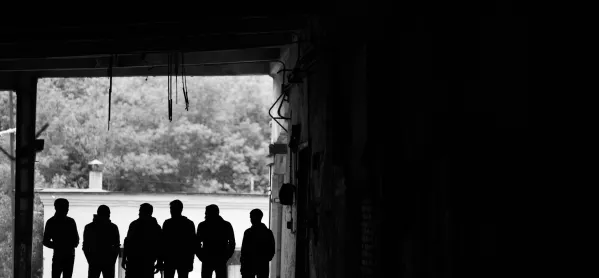- Home
- Coronavirus: Pressure on boys ‘to be a man is growing’
Coronavirus: Pressure on boys ‘to be a man is growing’

“Be a man” are often the three most terrifying words for boys and, indeed, men.
We know boys are struggling in today’s society, which is reflected in rising suicide rate among boys and men, drug-related deaths disproportionately affecting men, most violent crime being committed by men, and in that 95 per cent of the prison population is male. And now there is the worldwide crisis of Covid-19.
In western societies, idealised qualities of masculinity are things like toughness, fearlessness, engaging in risk-taking behaviour, and displaying violence, aggression and invincibility against any perceived threat. However, academic research has also recognised that, beside this “tough masculinity”, the shadow of vulnerability often co-exists.
Coronavirus: Impact on young people to be assessed
Mental health: An open letter to locked-down teenagers
Long read: Toxic masculinity and boys’ mental health
Right now, many boys and young men will be finding life tough, but embedded perceptions of masculinity may prevent them from opening up to their emotional turmoil. In lockdown, many will be feeling isolated, anxious and uncertain. But the vulnerability that many will be experiencing is perhaps being disguised through displays of risk-taking in their peer groups.
Coronavirus crisis: Protecting boys’ mental health and wellbeing
For example, large groups of boys and young men continue to congregate defiantly in public spaces, despite government warnings not to. Also, we are still seeing some males stating that coronavirus won’t affect them (dangerously incorrect when you read that more males than females are dying after being infected).
Those who live with boys, work with boys, or have boys in their families, all have a role to support young men at this time. We often just expect our young people to grow up and deal with the issues they face. In reality, it is not that simple.
With no school for the foreseeable future, young people have been freed of responsibility and routine. They spend most of their time indoors with parents and carers, have little personal contact with friends, and - for many teenagers - the cancellation of exams has brought even more uncertainty to their lives.
For adolescent boys going through puberty, a huge increase in testosterone production will be linked to changes in mood and behaviour - often with a corresponding increase in risk-taking, but also possibly depression. The stress and uncertainty associated with social distancing, social isolation, cancellation of school assessments and loss of normal routines will only exacerbate their emotional turmoil.
Generation Z is known as the activist generation, but it is also the one struggling with mental health. And there are particular forces at play that specifically impact on boys.
Boys need to be able to express emotions, but in his song Daughters, American singer-songwriter John Mayer says:
“Boys, you can break, you find out how much they can take.
“Boys will be strong and boys soldier on”.
Boys will be fine, Mayer insists. Yet, that will not be the case for many boys, who at this time need our support.
So, what’s needed? Keeping an open dialogue is important. As a teacher, parent or carer, we need to talk about our own feelings: what we promote we will permit. It is important that we open a dialogue on the issues we face, and help boys to see that their friends will be thinking similar things.
Importantly, as general stress and uncertainty around Covid-19 combines with anxiety about social distancing and isolation, it is important for boys to gain tools to enhance their sense of wellbeing. The purpose of the health and wellbeing area in Scotland’s Curriculum for Excellence, of course, is to help young people to develop the skills, capabilities and attributes for mental, emotional and social - as well as physical - wellbeing.
Key workers in schools are in a good position to introduce pupils to mindfulness. They can use the reduced formal curriculum contact time to encourage boys and young men - for a few minutes each day - to focus on breathing, sounds around them, and thoughts and emotions. In doing so, they can encourage boys to gradually enter a dispassionate state of self-observation and help them respond to the stress and anxiety of social isolation more reflectively.
For the men reading this piece, we believe this is a particularly crucial time to be the male role model that boys need. Just now, the only certainty is the uncertainty.
Human beings thrive when they have coherence and control, but our boys need support - we can’t simply expect them to “get on with it”.
Ross Deuchar is a professor of criminology, and former assistant dean at the University of the West of Scotland’s school of education. Graham Goulden is a former police chief inspector at the Scottish Violence Reduction Unit, who works with the Mentors in Violence Prevention programme
Keep reading for just £1 per month
You've reached your limit of free articles this month. Subscribe for £1 per month for three months and get:
- Unlimited access to all Tes magazine content
- Exclusive subscriber-only stories
- Award-winning email newsletters